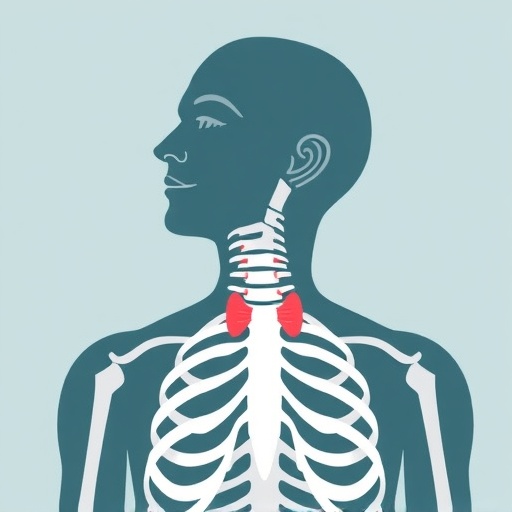Recent research has shed light on the potential relationship between ABO blood types and the aggressiveness of thyroid cancer in adults. Conducted by an accomplished team of researchers led by Ghunaim M., this insightful study not only explores the genetic and immunological implications of blood type but also opens up new avenues for understanding cancer prognosis. Thyroid cancer, a malignancy that has seen a notable increase in incidence, presents a complex interaction of genetic and environmental factors that stress the need for enhanced methods of risk stratification.
The research was conducted at a single center, utilizing a retrospective study design. Over recent years, there has been a growing body of literature that discusses the interaction between genetic factors, such as blood type, and cancer aggressiveness. However, the specific mechanisms by which ABO blood types may influence the biology of thyroid cancer remain largely understudied. The researchers compiled extensive data from patients diagnosed with various forms of thyroid cancer, focusing on clinical outcomes and blood type classifications to assess possible correlations.
In the methodology section, the researchers meticulously categorized the patient population based on ABO blood type—A, B, AB, and O. They analyzed demographic factors, clinical characteristics, and treatment responses, incorporating statistical tools to ascertain the significance of heretofore unexplored associations. The aim was to pinpoint whether distinct blood types corresponded with variations in tumor aggressiveness, thereby affecting clinical outcomes. The implications of such correlations could be substantial, potentially influencing both diagnostic and treatment pathways.
One of the striking findings of the study is that patients with type O blood exhibited different patterns of disease progression compared to those with non-O blood types. The data indicates that certain blood factors might modulate the host immune response, potentially impacting tumor behavior. Understanding these subtleties can inform clinicians about a patient’s prognosis, offering an age-old challenge: identifying which tumors will be more aggressive and potentially lethal while on the path to treatment.
Moreover, the study highlights that blood type-related differences in tumor behavior may arise from variances in angiogenesis, immune response, or even hormonal factors, each of which holds its own significance in the pathology of thyroid cancer. For example, type A blood has been associated with higher levels of certain hormones that may contribute to tumor proliferation. The interplay between these biological factors remains a fertile ground for further investigation, leading to a more nuanced approach to classifying thyroid cancer.
The retrospective nature of the study poses certain limitations, primarily regarding data completeness and patient follow-up. While the findings are indeed promising, they necessitate validation in larger, multicentric cohorts to eliminate confounding variables and establish a more robust framework for understanding the genetic underpinnings of thyroid cancer aggression related to blood types. Future research endeavors should aim to utilize advanced genetic profiling and longer follow-up periods to assess long-term outcomes.
The implications for oncologists and clinicians are profound. If ABO blood type can indeed serve as an indicator of cancer aggressiveness, it could pave the way for personalized treatment regimens. By considering blood type as a factor in treatment planning, oncology professionals can potentially improve patient outcomes. The ascertainment of a patient’s blood type could serve as an adjunctive tool in risk stratification, thereby enhancing the overall management of thyroid cancer.
This study also catalyzes important conversations regarding broader implications for cancer research. The interrelationship between blood types and various malignancies could potentially yield insights applicable to other cancers as well. Researchers are urged to consider ABO blood type as a variable in future studies on cancer epidemiology, immunology, and treatment outcomes.
As awareness and understanding of thyroid cancer continue to evolve, this groundbreaking research serves as a valuable stepping stone towards integrating genetic factors into everyday clinical practice. The findings challenge existing paradigms while beckoning a fresh perspective in the quest to unravel the complexities of cancer aggressiveness.
The research also underscores the necessity for interdisciplinary approaches in studying cancer, inviting collaboration among geneticists, oncologists, and immunologists to explore the proliferative phenomena associated with blood types. Addressing thyroid cancer’s multifaceted characteristics with diverse scientific methodologies can illuminate potential therapeutic targets and influence drug development for more effective interventions.
As we ponder the potential ramifications of this research, it becomes clear that understanding the genetic complexity of tumors like thyroid cancer is paramount. As an ever-evolving field, cancer research demands continuous inquiry and innovative perspectives. The findings from Ghunaim and colleagues highlight how subtle variables, such as blood type, can be leveraged to inform disease prognosis and management strategies.
In conclusion, the exploration of the role that ABO blood types play in thyroid cancer aggressiveness not only paves the way for enhanced patient care but also instills hope for breakthroughs in cancer research. The current study, while preliminary, underscores that an individual’s biological uniqueness should be considered when diagnosing, treating, and prognosticating cancer. As we embrace these revelations, the ongoing commitment to challenging antiquated understandings of tumor biology promises to serve the global effort in cancer research and patient care well into the future.
The influence of blood type on disease dynamics is an exhilarating subject ripe for further investigation, ensuring that oncologists are equipped with the tools necessary to navigate the complexities of cancer management more effectively.
Subject of Research: The relationship between ABO blood types and the aggressiveness of thyroid cancer.
Article Title: ABO blood types can play a role in determining the aggressiveness of thyroid cancer in adult patients: a single-centre retrospective study.
Article References:
Ghunaim, M., Alkhalifah, Z., Almontashri, A. et al. ABO blood types can play a role in determining the aggressiveness of thyroid cancer in adult patients: a single-centre retrospective study.
BMC Endocr Disord 25, 267 (2025). https://doi.org/10.1186/s12902-025-02059-z
Image Credits: AI Generated
DOI: https://doi.org/10.1186/s12902-025-02059-z
Keywords: ABO blood types, thyroid cancer, cancer aggressiveness, genetics, immunology.




